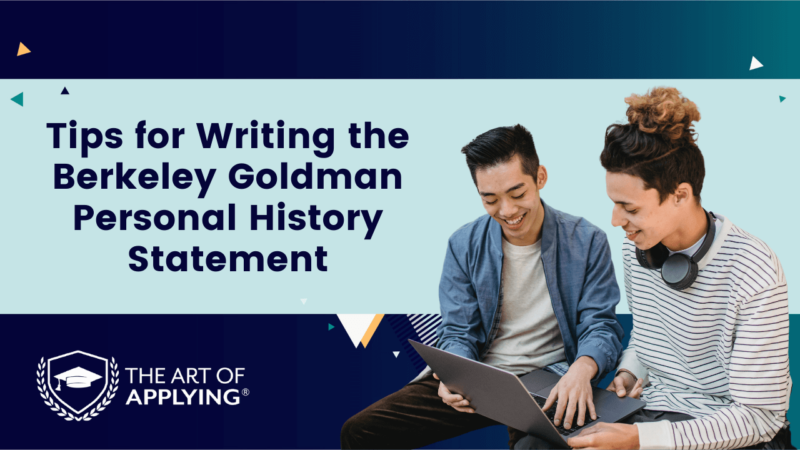Let’s first look at what the University of California – Berkeley, Goldman School of Public Policy’s website tells us about the Personal History Statement. This is a bit different from what other schools request.
Personal History Statement (submitted with online application). Please describe how your personal background informs your decision to pursue a graduate degree. Please include information on how you have overcome barriers to access in higher education, evidence of how you have come to understand the barriers faced by others, evidence of your academic service to advance equitable access to higher education for women, racial minorities, and individuals from other groups that have been historically underrepresented in higher education, evidence of your research focusing on underserved populations or related issues of inequality, or evidence of your leadership among such groups. There is no page length requirement for the Personal History Statement. However, this essay is generally 1-2 pages, double-spaced. [Source]
Tackle the prompt:
The first part of the prompt is somewhat vague and standard, focusing on “your personal background” and how it “informs your decision to pursue a graduate degree”, so let’s first focus on the rest of the prompt. They very specifically want to hear about barriers you’ve overcome and your understanding of barriers for others. This is likely easier for some of you than others.
If your personal story includes being the first person in your family to go to college, for example, definitely go there. If you haven’t had such obvious barriers, you’ll need to think a bit harder. If you recognize yourself as coming from a high degree of privilege, especially with respect to your access to education, you’ll do better to acknowledge that and name it rather than reaching for imaginary barriers. The admissions committee will see right through that. In this case, focus on the next part of the prompt, about your understanding of barriers faced by others. If you can relate that back to a comparison of your experience, the Statement will read more personal, which is generally a good thing as this is a part of the application (along with your Policy Statement of Purpose) where you get to establish yourself as a three-dimensional person.
Soul Search:
Before you start writing, do a bit of thinking–even soul-searching–about privilege, barriers, underrepresentation of some populations, etc. What is your personal relationship to these terms and what they represent? What have you done to work for change? The program has a clear focus, so you want to make sure you not only have the tools at the ready to write a compelling Personal History Statement, but also that you truly are a good fit, which is unlikely if you’re unable to write this Statement somewhat easily.
Essay Length: No more than 2 pages
While Goldman says there is not length requirement, since they say most are 1-2 pages, double-spaced this is an indication that they expect your Statement to be double-spaced, and you want to cut down your five-page essay to no more than three pages if 1-2 is the average. Shorter is generally better provided you’re not cutting out critical details or stories, but I’ve found most essays can be cut down by at least 20% to become stronger, more concise pieces. Remember the person reviewing your Statement reads many of these at a time, so the easier it is to skim and get the gist quickly, the more compelling your case to a tired, overworked admissions committee member.
Get an outside perspective:
As always with essays, get at least one outside, objective set of eyes on it to convey the main points they get from it and to assure you’re getting across what you intend. The Art of Applying is glad to help with this! After content, we read for typos or grammatical errors you may have missed, since you never want an otherwise impressive essay to be tarnished by mistakes. Admissions committee members can easily interpret these mistakes as you being a sloppy candidate who doesn’t care enough to proofread.
Start Early:
Finally, the best advice I can give on this one is to start early. Don’t put this off until the last minute since this is one that isn’t a given for what you’ll write. Set aside time to think, to brainstorm with a friend, and leave plenty of time to review and edit.
You’ve got this!
Let’s make your grad school dreams come true!
Get expert help with your application in The Art of Applying® Academy.




l would love to study at your college please
Hi Tawanda, The Art of Applying is not a college; it is a business that helps people apply to graduate schools. 🙂
Thank you for the insight. Greatly appreciated.
Thank you for the advise! Although, I am not clear whether the essay HAS to be related to barriers to higher education or it can be broader. The last sentence of the prompt states the following:
“…evidence of your research focusing on underserved populations or related issues of inequality, or evidence of your leadership among such groups.”
Would you say that social volunteer work, unrelated to education would fit into de prompt scope?
Thank you!
Thank you, a few words more valuable than 10pages of a blog post!
Kaneisha, I would also love to study at your colege please